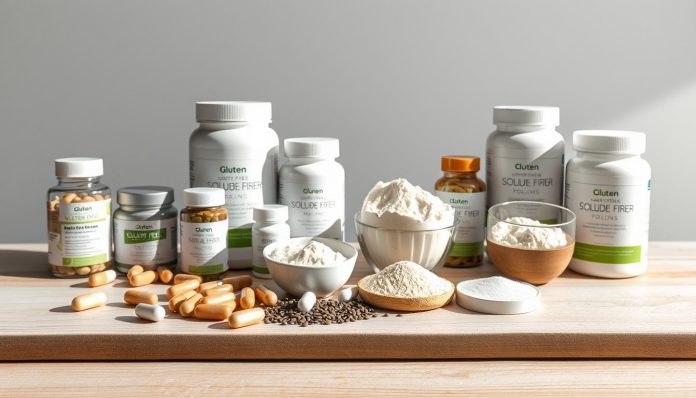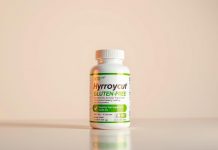Do you find it hard to get enough fiber, even on a gluten-free diet? The average American eats about 17 grams of fiber daily, which is less than half of what we should have1. Many people on gluten-free diets face this challenge because many gluten-free foods are low in fiber1. Soluble fiber helps by absorbing extra fluid and softening stool, which can prevent diarrhea and constipation2.
Finding the right gluten-free soluble fiber supplements is key for your gut health. These supplements can fill the fiber gap in your diet.
Table of Contents
Key Takeaways
- Gluten-free soluble fiber supplements can help fill the fiber gaps in your diet.
- Soluble fiber can aid in curbing hunger, contributing to successful weight loss strategies2.
- Top rated gluten free soluble fiber supplements, such as Sunfiber, are low FODMAP certified and suitable for individuals with celiac disease or lactose intolerance2.
- The typical American consumes about 17 grams of fiber per day, which is roughly half of the recommended daily intake1.
- Certified gluten-free foods, such as Banza pasta and ZenB pasta, can provide a significant amount of fiber per serving1.
- Best gluten free soluble fiber supplements can help support healthy digestion and overall gut health.
What is Soluble Fiber and Why is it Important?
Soluble fiber dissolves in water and turns into a gel in your stomach. This helps slow down how your body digests food and absorbs nutrients3. It can also lower “bad” cholesterol levels4. Plus, it helps control blood sugar by slowing down sugar absorption5.
Gluten free soluble fiber supplements offer many benefits. They support healthy digestion and prevent constipation4. They’re great for managing blood sugar levels5. Foods like fruits, oats, and beans are rich in soluble fiber. They help you feel full, which is good for weight control5.
Many gluten-free products have less fiber than their gluten-containing versions5. Adding gluten free soluble fiber supplements to your diet can fill this fiber gap. For more details, check out this resource.
In summary, soluble fiber is key for healthy digestion and blood sugar control. Gluten free soluble fiber supplements are a great addition to a gluten-free diet345.
Overview of Gluten-Free Diets
Understanding gluten-free diets is key when looking at fiber supplements for gut health. A gluten-free diet is vital for those with celiac disease or gluten sensitivity. It prevents damage to the small intestine and eases symptoms like bloating and diarrhea6. About 1% of people have celiac disease, needing a gluten-free diet for life6.
Natural gluten-free fiber supplements are great for those on a gluten-free diet. They help keep the gut healthy. In the U.S., foods labeled gluten-free must have less than 20 ppm of gluten6. Also, 6-7% of people may have non-celiac gluten sensitivity, which gets better with a gluten-free diet6.
There are many gluten-free fiber supplements to choose from. Foods like fruits, veggies, and whole grains like brown rice and quinoa are also good sources of fiber7. Adults and teens need 25-35 grams of fiber daily. Kids over 2 should get grams of fiber equal to their age plus 57.
Along with fiber supplements, a well-planned gluten-free diet can meet fiber needs. Foods like Indian ricegrass, flaxseed meal, and garbanzo flour are high in fiber. They have 36 grams, 33.5 grams, and 21 grams of fiber per cup, respectively7. Adding these foods and supplements to your diet can help keep your gut healthy and support your overall health.
Top Gluten Free Soluble Fiber Supplements Available
There are many gluten-free soluble fiber supplements to choose from. Metamucil and Benefiber are among the top choices. Metamucil has 5 grams of fiber per serving and comes in a big container with 180 servings8. Benefiber gives you 3 grams of soluble fiber per serving and has 62 servings in total8.
Prebiotic supplements like Thorne FiberMend and NOW Foods Psyllium Husk Powder are also great. Thorne FiberMend has 6 grams of soluble fiber per serving and offers 30 servings8. NOW Foods Psyllium Husk Powder gives 6 grams of fiber per serving and has 38 servings8. The U.S. recommends 20-30 grams of fiber daily, but most people only get about 15 grams9.
Some popular gluten-free soluble fiber supplements include:
- Metamucil
- Benefiber
- Thorne FiberMend
- NOW Foods Psyllium Husk Powder
These supplements help with digestion and bowel movements. When picking a supplement, look at the ingredients, serving size, and cost9.
How to Choose the Right Soluble Fiber Supplement
Choosing the right soluble fiber supplement is key. With many options like gluten free soluble fiber capsules and powder, it can be tough. A big reason is that 95% of Americans don’t get enough fiber10.
Think about the type of fiber, if it’s gluten-free, and how much to take. For example, Viva Naturals Organic Psyllium Husk Powder has 4 grams of fiber per teaspoon11. Always check the labels for gluten-free claims and ingredients. The daily fiber goal is 25 grams for women and 38 grams for men, but most don’t reach it10.
Here are some key things to consider:
- Type of fiber: Choose soluble fiber sources like psyllium or inulin.
- Gluten-free certification: Make sure the supplement is gluten-free.
- Dosage: Start with a low dose and follow the recommended amount.
Don’t take too much fiber at once. It can cause cramps and stomach problems11. Always talk to a doctor before starting any new supplement.
Health Benefits of Soluble Fiber
Soluble fiber is great for your health. It helps with digestion, lowers cholesterol, and aids in weight management12. Gluten free soluble fiber supplements can also control blood sugar levels. They slow down sugar absorption, preventing spikes after meals12. Plus, they can lower bad cholesterol, which is good for your heart13.
Some of the key benefits of soluble fiber include:
- Supporting healthy digestion and preventing constipation12
- Reducing cholesterol levels and improving cardiovascular health13
- Aiding weight management by promoting feelings of fullness and preventing overeating12
The daily fiber intake varies by age and gender. Women should aim for at least 25 grams of fiber each day, says the Academy of Nutrition and Dietetics12. The American College of Gastroenterology notes that 10-15% of the U.S. population has Irritable Bowel Disease (IBS). This shows how important a high-fiber diet is14.
In conclusion, adding soluble fiber to your diet can greatly benefit your health. It supports digestion and helps with weight management. Choosing the right gluten free soluble fiber supplements is key to meeting your dietary needs12.
Understanding Fiber Types: Soluble vs. Insoluble
Keeping your gut healthy means knowing about different fibers. Soluble and insoluble fiber each offer unique benefits. Soluble fiber can lower cholesterol by stopping some dietary cholesterol from being absorbed15. Insoluble fiber helps prevent constipation and aids in moving waste15.
Eating a diet rich in fiber can lower disease risks. This includes obesity, heart disease, diabetes, and metabolic syndrome15. Aim for five servings of fruits and veggies daily for fiber16. Choose whole-grain foods for half your grain intake, with at least 2 grams of fiber per serving16. Natural gluten free fiber supplements can also support gut health.
The National Academy of Medicine suggests 21 grams of fiber for women over 50 and 25 grams for younger women. Men should aim for 30 grams over 50 and 38 grams for younger men16. Sadly, only 5% of Americans get the daily 30 grams of fiber17. Adding gluten free fiber supplements to your diet can help meet these needs and improve health.
| Fiber Type | Benefits | Food Sources |
|---|---|---|
| Soluble Fiber | Lowes cholesterol levels, stabilizes blood sugar levels | Beans, peas, oats, barley, apples, citrus fruits |
| Insoluble Fiber | Prevents constipation, reduces bowel movement frequency | Beans, whole wheat or bran products, green beans, potatoes, cauliflower, nuts |

How to Incorporate Soluble Fiber into Your Diet
To add soluble fiber to your diet, know how much you need and where to find it. You should aim for 20-35 grams of soluble fiber each day18. Foods like fruits, veggies, and whole grains are good sources. For example, oats, barley, and rye are high in soluble fiber. You can eat them as gluten free soluble fiber supplements or as whole foods.
When picking the best gluten free soluble fiber supplements, look at the fiber type and dosage. Popular options include psyllium husk, acacia fiber, and inulin. Remember to drink lots of water with fiber supplements to help with digestion and avoid side effects18.
Here are some tips to add soluble fiber to your meals:
- Begin with small amounts of fiber supplements and slowly increase them to avoid stomach issues18.
- Choose certified gluten-free products to meet your dietary needs19.
- Eat more whole foods like fruits, veggies, and whole grains to increase your soluble fiber intake.
By following these tips and adding soluble fiber to your diet, you can enjoy many health benefits. These include better digestion, blood sugar control, and lower cholesterol18.
Potential Side Effects of Fiber Supplements
Adding gluten free fiber supplements to your diet can have side effects. You might feel bloated, gassy, or uncomfortable in your stomach, at first20. To avoid these, start with a small amount and drink lots of water.
Begin with a small dose and slowly increase it. Pick a supplement that’s easy on your stomach. If problems persist, see a doctor for advice21.
Some people might be more sensitive to these effects. If you have a sensitive stomach or a health condition, watch how your body reacts. Being careful and adjusting your intake can help you enjoy the benefits without discomfort.
Here are some tips for safely adding fiber supplements to your diet:
- Start with a low dose and gradually increase
- Drink plenty of water to help fiber move through your digestive system
- Choose a high-quality supplement that is gentle on the stomach
- Monitor your body’s response and adjust your supplement routine as needed
By following these tips and knowing about possible side effects, you can safely add gluten free prebiotic supplements to your diet. This supports a healthy digestive system20.
Frequently Asked Questions About Fiber
When looking at top rated gluten free soluble fiber supplements or gluten free soluble fiber capsules, many questions come up. One big one is when the best time to take them is22. The FDA now says dietary fiber includes carbs like acacia and glucomannan22.
Another common question is if you can take too much fiber23. The Academy of Nutrition and Dietetics says we should eat 21-38 grams of fiber daily from plants23. Sadly, most of us only get half of that23.
People often wonder how long it takes to see fiber’s effects. Soluble fiber can help lower blood sugar and cholesterol, and make bowel movements more regular22. Sunfiber, a soluble fiber, should be taken in 3-7 gram doses24. Plus, Sunfiber is safe up to 60 grams a day24.

When picking top rated gluten free soluble fiber supplements or gluten free soluble fiber capsules, think about these things:
- Find products with low FODMAPs to avoid gas and bloating24.
- Go for slow fermentation to avoid stomach upset24.
- Look for products that make short-chain fatty acids for better gut health24.
The Science Behind Soluble Fiber and Gut Health
Studies show that soluble fiber is good for gut health. It helps reduce inflammation and improves the gut microbiome25. Gluten free soluble fiber supplements and gluten free fiber supplements for gut health offer many benefits. They help with healthy digestion and reduce symptoms of irritable bowel syndrome.
Only 5% of adults get enough dietary fiber, which is about 25 grams a day for women and 38 grams for men25. The daily fiber intake varies by country, with some suggesting up to 30 grams a day26. A high-fiber diet can lower blood cholesterol and stabilize blood sugar. This can help prevent heart disease and other health issues.
The following table summarizes the recommended daily intake of dietary fiber for different age groups and countries:
| Age Group | Country | Recommended Daily Intake |
|---|---|---|
| 19-50 years | USA | 25 grams (women), 38 grams (men)27 |
| 51+ years | USA | 21 grams (women), 30 grams (men)27 |
| 19-50 years | Canada | 25 grams (women), 38 grams (men)26 |
In conclusion, the science is clear: a high-fiber diet is beneficial for gut health. It supports healthy digestion and reduces symptoms of irritable bowel syndrome. Adding gluten free soluble fiber supplements and gluten free fiber supplements for gut health to your diet can improve your gut health. This can also lower the risk of chronic diseases.
Success Stories: Real Users Share Their Experiences
Many people have seen great results with gluten free soluble fiber supplements. They say these supplements have helped with digestion, reduced IBS symptoms, and boosted energy28. These supplements are a big help for those who can’t handle gluten, helping them feel better overall.
Some folks have found that these supplements help control blood sugar and improve gut health29. Soluble fiber slows down sugar absorption, which helps avoid big blood sugar swings30. It also makes the body more sensitive to insulin, lowering the risk of insulin resistance30.
Here are some key benefits of using gluten free soluble fiber supplements:
- Improved digestion and reduced symptoms of IBS
- Increased energy levels
- Regulated blood sugar levels
- Improved gut health
Real users’ success stories show how effective gluten free soluble fiber supplements are. By adding these supplements to their diet, people can enjoy better digestion, more energy, and other health perks28.
Testimonials from Users
Many users have shared their positive experiences with gluten free soluble fiber supplements. They talk about how these supplements have improved their health and well-being29. These stories highlight how these supplements can help manage symptoms and enhance health outcomes.
Improvements in Health and Wellness
Gluten free soluble fiber supplements have been shown to boost various health areas. They can improve digestion, energy, blood sugar control, and gut health30. Adding these supplements to your diet can lead to a range of benefits and better overall health and wellness.
Conclusion: Making the Right Choice for Gut Health
Adding gluten-free soluble fiber supplements to your daily routine can greatly improve your gut health and overall wellness31. Soluble fiber is key for healthy digestion, managing blood sugar, and lowering cholesterol32. By picking the right gluten-free supplements, you can enjoy these benefits without gluten’s risks.
Struggling with constipation, diarrhea, or wanting a better gut microbiome33? Soluble fiber supplements can help a lot. Try different ones to find what works best for you. With the right choice, you can boost your gut health and feel much better.
For a healthy gut, eat foods high in soluble fiber and use supplements as needed32. So, choose to focus on your gut health today. Start a journey towards more energy and well-being.
FAQ
What is the best time to take soluble fiber supplements?
Can you take too much fiber?
How long does it take to see results from taking soluble fiber supplements?
What are the benefits of soluble fiber for gut health?
How do soluble and insoluble fiber differ, and when should I use each type?
What are some common side effects of fiber supplements, and how can I minimize discomfort?
What are the key factors to consider when choosing a gluten-free soluble fiber supplement?
Source Links
- Best Top Dietitian-Approved Gluten-Free Fiber Supplements – https://delectablefoodlife.com/best-top-dietitian-approved-gluten-free-fiber-supplements/
- The 9 Best Fiber Supplements of 2025 That Are Expert Recommended – https://www.everydayhealth.com/nutritional-supplements/best-fiber-supplements/
- Foods High in Gluten-Free Fiber – https://www.webmd.com/diet/foods-high-in-gluten-free-fiber
- Soluble Fiber – Everything You Need to Know – https://sunfiber.com/soluble-fiber/
- Fabulous Fibre: The Benefits of Including More In Your Gluten Free Die Food Online Australia – https://www.gfnation.com.au/blogs/learning/fabulous-fibre-the-benefits-of-including-more-in-your-gluten-free-diet?srsltid=AfmBOorRzlvhetlt-kT4Be_ng2CfAz8jE0oMoXKUVYgPrM6whip3nLBD
- The good news is that you don’t have to go completely grain-free. – https://www.mayoclinic.org/healthy-lifestyle/nutrition-and-healthy-eating/in-depth/gluten-free-diet/art-20048530
- Gluten-Free Ways to Eat More Fiber – https://www.massgeneral.org/children/celiac-disease/glutenfree-ways-to-eat-more-fiber
- What Dietitians and Doctors Want You to Know About Fiber Supplements – https://www.prevention.com/health/g62044344/best-fiber-supplements-brands/
- 8 best fiber supplements for constipation and health – https://www.medicalnewstoday.com/articles/best-fiber-supplements
- Fiber Supplements Explained: Types, Benefits, and Risks – https://www.rupahealth.com/post/fiber-supplements-explained-types-uses-and-considerations
- You’re Probably Not Getting Enough Fiber. Here Are 6 Fiber Supplements Dietitians Recommend – https://www.eatingwell.com/best-fiber-supplements-8548491
- What is the Best Fiber Supplement for Women? How to Choose | Season – https://www.seasonhealth.com/blog/best-fiber-supplement-for-women
- Fabulous Fibre: The Benefits of Including More In Your Gluten Free Die Food Online Australia – https://www.gfnation.com.au/blogs/learning/fabulous-fibre-the-benefits-of-including-more-in-your-gluten-free-diet?srsltid=AfmBOoogQz1m6O_IId2Vu4F_Z4d25ATeydQwsuLblvePqMA3Ct6ypGqA
- Health Benefits of Fiber Supplements – https://coopercomplete.com/blog/health-benefits-of-fiber/?srsltid=AfmBOoofopxpLhiPxIoeAOAoNcYdYBn3qd2qUsrCWzPzzYq3lYS85dIk
- Soluble vs. insoluble fiber: What’s the difference? – https://www.medicalnewstoday.com/articles/319176
- How to add more fiber to your diet – https://www.mayoclinic.org/healthy-lifestyle/nutrition-and-healthy-eating/in-depth/fiber/art-20043983
- Types of Fiber and Their Health Benefits – https://www.webmd.com/diet/compare-dietary-fibers
- The Essential Guide to Gluten-Free Fiber Supplements – https://www.geneticnutrition.in/blogs/genetic-life/the-essential-guide-to-gluten-free-fiber-supplements?srsltid=AfmBOoqM2Rq6fjcxfFqdWLBeloP3Jhjcr6dc8kVTo151goPW9FscVUMq
- 7 Fiber Supplements That May Be OK If You’re Gluten-Free – https://www.verywellfit.com/gluten-free-fiber-supplements-562295
- What Happens to Your Body When You Take a Fiber Supplement – https://www.eatingwell.com/benefits-of-fiber-supplements-8420645
- How Much Fiber Is Too Much? Effects, Treatment, and More – https://www.healthline.com/health/food-nutrition/too-much-fiber
- Questions and Answers on Dietary Fiber – https://www.fda.gov/food/nutrition-food-labeling-and-critical-foods/questions-and-answers-dietary-fiber
- FAQs About Fiber and Benefiber | Benefiber – https://www.benefiber.com/fiber-faq/
- Frequently Asked Questions – Sunfiber – https://sunfiber.com/frequently-asked-questions/
- Fiber supplements and clinically proven health benefits: How to recognize and recommend an effective fiber therapy – https://pmc.ncbi.nlm.nih.gov/articles/PMC5413815/
- Dietary Fiber Intake and Gut Microbiota in Human Health – https://pmc.ncbi.nlm.nih.gov/articles/PMC9787832/
- PDF – https://health.cornell.edu/sites/health/files/pdf-library/fiber-digestion-health.pdf
- Gluten free-dom: my journey to becoming an unintentional expert – https://pmc.ncbi.nlm.nih.gov/articles/PMC4059589/
- How A Gluten Free Diet Helped Me Cure My PCOS – TheSmooco.com – https://thesmooco.com/blogs/blog/gluten-free-diet-for-pcos?srsltid=AfmBOoryJHTOLCNtBhYg39ehemYOav0OlOeF-qLTCuim1bwRj03vyU_u
- fiber and blood sugar – part 1 + 2: beyond digestion + your daily fiber blueprint – https://nestwellness.substack.com/p/fiber-and-blood-sugar-part-1-2-beyond
- Probiotics, Prebiotics and Other Dietary Supplements for Gut Microbiota Modulation in Celiac Disease Patients – https://pmc.ncbi.nlm.nih.gov/articles/PMC7551848/
- Health Benefits of Fiber Supplements – https://coopercomplete.com/blog/health-benefits-of-fiber/?srsltid=AfmBOoqnUzHjahn6trU-UBma0YjQWIzRN0Rh4c53_QN1T6WAYQ8awfI3
- How Do You Choose the Best Fiber Supplement? – https://health.clevelandclinic.org/best-fiber-supplements












